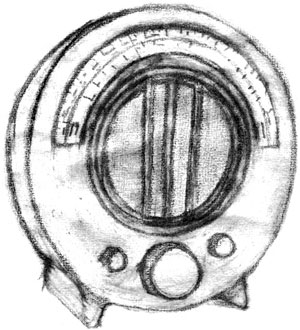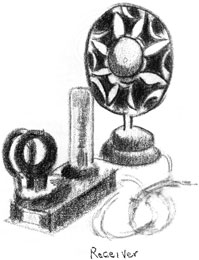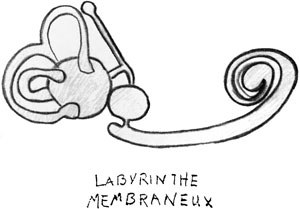![]()
“If one hears it, one is
liberated simply by not disbelieving. . . .”
—The Tibetan Book of the Dead
Each day we broadcast to Tibet. This past spring the Tibetan Information Network said, “A major political education campaign now being carried out in Tibet is reported by some sources to be an attempt to counteract the effectiveness” of our Voice of America Tibetan-language broadcasts. “ Scores of Chinese and Tibetan officials,” it was said, “have been sent to rural reigons to spend up to four months giving political education on the benefits of socialism.”
Reportedly, officials complained that the villagers didn’t listen to Chinese TV and radio news, but knew VOA’s broadcast time and frequencies and, not surprisingly, knew “all about the activities of the Dalai Lama.” Commenting on the villagers’ backwardness, one Chinese official said they “fold their hands while listening as if someone is going to give them something.”
There is irony in this. The official’s communist ideaology is an outdated scientism, a cargo cult awaiting unseen historical forces. Yet he ciriticised the Buddhist villagers’ reverence for the radio. Where in the views of Marx, Lenin or Mao is there anything like the cosmological flights of the ancient Buddhist scriptures? The Perfection of Wisdom contains wild seeds of imagination that resonate within modern scientific ideas-relativity, space travel, recursive structures, lasers, holograms, virtual reality, telecommunication, signal encryption. That is one reason why Tietan villagers fold their hands in front of their shortwave sets.
On the transmitting end, radio is a technology of replication and dissemination, a step beyong printing (which was invented in China perhaps to produce multiple copies of the Perfection of Wisdom scriptures). But on the receiving end, radio is a way to draw down other worlds, to capture and encase knowledge. Radios are like portable reliquaries. At Tashilhunpo monastery, the golden-varnished body of the late Panchen Lama sits in a glass case. Among the folds of his brocaded robes is a white Bakelite radio.

Thus I have heard: Once, the Blessed One [Shakyamuni] was staying on Vulture Peak at Rajagriha accompanied by eight thousand monks from the mahadangham seventy two thousands bodhisattvas, and devaputras from the Kamadhatu and the Rupadhatu. The Blessed One was surrounded by a retinue of many hundreds of thousands who had come to receive teachings.
Then a devaputra named Prashantaviniteshvara, in the assembled retinue, paid his respects by touching the tip of his head to the bottom of the Blessed One’s feet. With palms of his hands together he bowed to the Blessed One and said, “Blessed One, where is Kumarabhuta Manjushri? All of us in your retinue beg you to teach us this.”
On this day, I am somewhere in Tibet, listening to my portable shortwave set. Our program this morning includes a report on the Dalai Lama’s current trip to the United States. Our interview of him the last time he came to Washington had been the first media interview he’d given in which both questions and answers were in Tibetan. Our broadcast of that interview had been the first time since 1959 Tibetans inside Tibet could hear his voice speaking about political bondage and political liberation. It’s another reason why listeners might hold their hands as if expecting a gift. I’ve been surprised on this trip to hear so many Tibetans, knowing only that I’m an American tourist, say, “The Dalai Lama is in America now. We all listen to the Voice of America. America is great.” I dismiss a suspicion that they’ve been planted to draw me out. But do they even know where America is?
The Blessed One said, “Devaputra, east of this buddha-sphere, past eighteen thousand buddhaspheres, there is a world-system called Ratnavati, where a samyaksambuddha tathagata arhat named Ratnaketu lives, prospers, and teaches. This is where Kumarabhuta Manjushri is.”
On my Panasonic, I hear jamming on three of our five frequencies. One sounds like an electrical motor; a second is an overmodulated wheeoowheeoowhee. A third is VOA submerged under co-channeled Radio Beijing Spanish. Two frequencies are clear. I stand here in the sunlight on the dry Tibetan plateau and hold up a little black box to my ear and hear my staff speaking at this very moment at night in our studio in Washington. I plug in a tiny cassette recorder into the radio and tape a part of today’s show on each frequency so our engineers will be able to hear how well the signal gets through.
Then the devaputra Prashantaviniteshvara made a request of the Blessed One: “With your knowledge of all signs, it would be good if you would send a kind of signal to the mind of Kumarabhuta Manjushri such that he would come here. For we do not hear; Blessed One, from the supporters of any of the shravakas, pratyekabuddhas, or bodhisattvas, the teaching of such doctrine as we hear from Kumarabhuta Manjushri. Besides tathagatas, there is no one else who can teach the doctrine in such a way. . . .”
After our interview in Washington with the Dalai Lama, he had said how glad he was that VOA was beginning to broadcast in Tibetan. It would be very different from the Chinese-controlled news media, he’d said—no censorship. Then, smiling, he said as a kind of question, “Instead, some would say self-censorship?” We laughed. I thought of it months later when we were reporting on Congressional testimony that VOA was insulated from political interference from our colleagues at the State Department. There was a firewall, it was said, between VOA and State. I heard our translation as it went out over the air. There was a me’i rtsig pa between VOA and the State Department, we said—a “wall of fire.” Ouch.
On the state-controlled radio and TV news in Lhasa, everything outside of China seems to be falling apart, and everything at home seems to be at peace. The TV news shows geriatric Party leaders at meetings and dinners, raising their hands in assent, toasting moments in the progress of Socialism. Drama is added by a shot of welding sparks on a truck assembly line, or a shot of a convoy of the People’s Liberation Army on route “to help the minority peoples.” Programming is produced in Beijing and sent via satellite to Lhasa for broadcast. This includes episodes of Falcon Crest dubbed into Chinese.
Then the Blessed One, having fully understood the request of the devaputra Prashantaviniteshvara, emitted a ray of clear light from the umakosha on [the center of his forehead. Brilliantly illuminating the three thousand worlds of this world-system, this great light passed through eighteen thousand worldsystems to the world-system of the samyaksambuddha bhagavan tathagata arhat Ratnaketu in the buddha-sphere called Ratnavati, and enveloped it.
VOA’s daily broadcasts are the only American programming besides Falcon Crest in Tibet. We don’t read scriptures over the air; our script is the news. Our halfhour shows have newscasts and background reports from correspondents overseas on major news stories, or other human-interest features. But the more basic structure of the news itself is the flood of samsara—impermanence, suffering, selflessness—which informs reporters’ working assumptions: First, any piece of news is precious today but worthless tomorrow. Second, good news that is not suspect or trivial is rare. Third, no piece of news exists in and of itself; it’s a partial truth, a convention that conceals as it reveals. What the individual stories in a newscast say is important, but so is the selection and sequence of the stories. The worlds the news lineup leaves in the dark are larger than the worlds it illuminates.
Then, in unison, the mahabodhisattvas there asked the samyaksambuddha bhagavan tathagata arhat Ratnaketu, “Blessed One, this great light present here, from whom has this sign come?” The bhagavan Ratnaketu said, “Kulaputras, to the west of this buddha-sphere, past eighteen thousand buddha-spheres, there is a world-system called Earth where a samyaksambuddha bhagavan tathagata arhat named Shakyamuni lives, prospers, and teaches. The samyaksambuddha bhagavan tathagata arhat Shakyamuni, by emitting a ray of clear light from the urnakosha on his forehead, has caused this great light, having passed through eighteen thousand buddha-spheres, to appear in this world-system.”

I’m traveling with a tourist group, carrying a tourist visa. On this trip I’ve often thought about Robert Ford, who operated Tibet’s first radio station. After the Chinese invaded, they put him in prison. Nowadays, Chinese media call VOA the major weapon in a propaganda war being waged against China. But here I am anyway. Understandably, no one from Tibet has been reckless enough to write to us, so—as one of our listeners said in a letter from a refugee settlement in India—this is the only way to see “peacocks dance when they hear thunder.”
The mahabodhisattvas asked him, “Blessed One, for what reason did that samyaksambuddha tathagata arhat send this ray of clear light?” The blessed one Ratnaketu said, “To signal Kumarabhuta Manjushri. Why? To make Kumarabhuta Manjushri go there.”
Our tourist bus follows the road around the turquoise waters of a lake, and we drive up to a pass. We stop at 16,400 feet. Just beside us, a peak rises up to 24,000 feet into dark blue space. White crystal plumes of snow stretch into the wind at the top, blowing like silk scarves from the back of the black rock.
The bus driver lets air out of the tires so they don’t explode in the thin air. I stumble off the bus to face the mountain. Its huge mass transfigures everything into its echoes and shadows. My touring companions take a few steps outside. They wheeze; their cameras whir and click.

The innumerable mahabodhisattvas and the many de vas, nagas, yakshas, and gandharvas who were collected around Kumarabhuta Manjushri looked at him and wished they could hear him teach the doctrine, but the tathagata Ratnaketu said to him, “Since the glorious bhagavan tathagata Shakyamuni and all those in his retinue wish to see you, go there to the world-system called Earth.”
Far across the road, grazing on golden moss, are yaks, tiny dots at eighteen thousand feet. In the other direction, two black nomad tents are pitched a few hundred yards from us down a gentle slope. A leather-skinned woman walks up from the tents, carrying on her back a shirtless brown baby. Their hair shines with yak butter. The woman greets us, extending her flat tongue, and then speaks to us.
Manjushri paid his respects to him and said, “Blessed one, I pay respect to the source of this sign as well.” Kumarabhuta Manjushri, along with ten thousand bodhisattvas, paid their respect to the feet of the tathagata Ratnaketu with the tops of their heads. Three times those powerful beings circumambulated the bhagavan tathagata arhat samyaksambuddha Ratnaketu. Then they opened their folded hands like lotus blossoms, and in an instant they came to the world-system of Earth. They arrived there, but were invisible.
She walks over to the bus. What is it like to live here? I wonder. Do her world and mine intersect at more than this one point right here and now? Does she have a radio?

As an act of respect to the bhagavan tathagata arhat Shakyamuni, they caused a beautiful heavy rain of fragrant, colorful flowers never before seen or heard of The three thousand worlds of this world-system were filled knee-deep with that heavy rain of flowers.
I realize she’s smiling now, not at us but at the bus—or, rather, at something on the outside of the bus by the door: a large sticker picturing the head of a dog, a German shepherd. Until now I’d only barely noticed it, one of a bunch of stickers from the trekking groups that have used the bus. It’s like the fish and deer stickers on pickup trucks in the States. It’s completely unremarkable, except that this very remarkable being who lives up here in this awesome immensity has fixed her attention on it as if it were an augury. She touches the sticker-dog’s smooth tongue. She says how much she likes the picture, how special it is. The bus driver guffaws-he’s from the big city of Lhasa. The moment dissolves. We tourists get back on the bus and ride down the other side of the pass.
Everyone in the retinue, seeing the heavy rain of flowers, was amazed. They asked, “Blessed one, whose magical power has caused such a heavy rain of flowers, so pleasing to see?” The blessed one said, “It is Kumarabhuta Manjushri and his companions, ten thousand bodhisattvas from the world-system Ratnavati. They have arrived at Earth but are invisible, and they are paying their respects to the tathagata. This is the reason they have caused such a great rain of flowers.”
In New Delhi a fortnight later, I have a dream in which she appears. She’s a spirit, a protector of the pass. She gestures; each of her movements seems bursting with powerful but inchoate meaning. Our encounter is no longer a loose strand of fragmentary impressions but the turning point of my trip. The infinite details that aligned for me to come converge on that high barren point on the pass. She raises her dark hand into a circle of light and touches the sticker-dog’s open, panting mouth. The grass, the bus, the mountains, the sky, and the stars wheel around in a vortex of significance. And their deepest significance is revealed to be that they signify nothing other than themselves; yet this seems wonderful. I wake up in my shabby hotel room and write down the dream in my journal.
Those in the retinue asked him, “Blessed one, we wish to see Kumarabhuta Manjushri and the mahabodhisattvas.” Then Kumarabhuta Manjushri and the thousand bodhisattvas descended together from the illuminated heavens, and paying their respects with the tops of their heads to the feet of the blessed one, the mahabodhisattvas and Kumarabhuta Manjushri alighted in a demonstration of each one’s own magical emanation.
On the street outside the VOA bureau in New Delhi at noon that day, I walk up behind a scooter-wallah who’s just dropped off a customer at the street corner. With the few words we have in common, we agree on the fare from there to my hotel. I climb into the small compartment in the back of the scooter. He gets in and sits just in front of me. He grabs the handlebars and kick starts the engine. I look forward. There’s darkness all around except for the rectangular windshield, like a lit TV screen. In the center of it, the driver’s head, in black, takes up most of my vision; his head seems to be my own head in negative space. But on either side, stuck on the windshield, are stickers—German shepherds’ heads, each turned to face the center. The dogs’ heads, above the driver’s, float in the light. The stickers are smaller but otherwise perfect echoes of the one on our bus in Tibet, except that a wedge is sliced out of each of these, where the dog’s mouths and tongues should be.
I lean forward and yell over the engine’s roar into the driver’s ear, “You like dogs, eh?” He smiles, uncomprehending. For the moment, he’s as mute as his tongueless sticker-dogs. But the banality of his expression, like the absurd banality of the stickers themselves, only deepens my sense that, well, some other meaning is beaming itself into this world.
Thank you for subscribing to Tricycle! As a nonprofit, we depend on readers like you to keep Buddhist teachings and practices widely available.